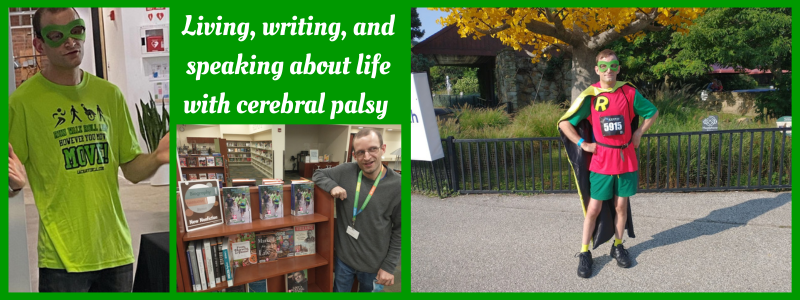Living with a disability like cerebral palsy you will probably endure some gloomy comments hurled your way. This negative feedback can vary in nature. Innocent remarks such as receiving an “I’m sorry” once a stranger learns about your CP. Although seemingly kind, the apology represents pity. An inference a disabled life remains a pitiful one. That does not need to hold true!
Other negative feedback could prove intentionally malice. Just consider the bullying too frequently endured. A bully sees differences and locks in on his target. Whether mean spirited or accidental, the negative feedback may cause damage. The key to preventing the hurt involves how you perceive the message. A profound wisdom I obtained awhile back while writing my second book Rock Realities (the link below to Rock Realities’ Amazon sales page is affiliated with the Amazon LLC Associate Program, an affiliate advertising program designed to provide a means for sites to earn advertising fees by advertising and linking to Amazon.com).
For Rock Realities I interviewed various independent musicians, the goal in-part to help aspiring musicians better understand the music industry. Certainly no CP-centric project, yet I happened to talk to three different musicians experiencing cerebral palsy themselves. So Rock Realities offers the cerebral palsy community reason to read. Before I veer off into a full sales pitch, let me regain my focus.
Chris Hendricks stands out amongst those three abovementioned musicians. His insightful take regarding negative feedback proving a big reason why. Without further hype, permit me to present an excerpt from Rock Realities, featuring Hendricks’ insight.
Excerpt from Article “The Art Comes First”
In an early interview I conducted with Chris he cited a goal becoming recognized as a great musician, not just a great musician with cerebral palsy. When asked about said goal in January 2015 Hendricks said ‘At this point in my career that’s less important as again the art itself and the music.’
He reflected on the early goal. ‘I think that early on in my career that felt like a motivation but in the end it was sort of an indication of how young I was as far as this craft is concerned. The veterans and the people that really, really care about that stuff sort of let it go and they realize what you desire will work out in time as long as that’s what you truly want.’
Letting go enabled Hendricks to make an observation. ‘The more I talked up the fact I was worried how people were going to see me the more I saw people viewing me as a person with a condition. When I let it go and stopped caring, they stopped caring.’
Turning Point
Asked if a certain trigger led to this changed mindset Hendricks answered, ‘The trigger for me was we did a series of Youtube videos. Initially I was so concerned about how people were going to react so I would check on the comments. Each time I saw a comment that was negative, I wouldn’t say it was life shattering, but it sort of hit me like a bullet.’
More an audio person Hendricks doesn’t really like watching the actual Youtube videos but forced himself to one day. ‘I was forcing myself to watch one of the videos that we put together and in the midst of watching that video I noticed there were some good, some positive comments, some negative comments but I thought to myself ‘If there is at least one positive comment there then I’m doing my job. If I’ve helped at least one person, then who gives a fuck what anyone else thinks?’’
Moving forward Hendricks learned to handle feedback differently. ‘That’s the number one thing I can give to really anyone. It doesn’t matter whether you’re pursuing art or something athletic. It’s not the feedback itself. It’s how you receive it.’
When questioned for an example Hendricks told ‘Sometimes I would get messages. Probably the most obvious is someone would watch a video and the comment would be like ‘It’s clear there is something wrong with this kid.’’
Rather than taking said comment like a bullet, Hendricks explained “I was able to internalize it and kind of shift the message in my head and that feedback sounded more to me the person was saying ‘I’m missing the point of this.’ Or ‘I don’t get it.’ … It was more about the other person and less about me.”
Negative Feedback’s Real Message
Perchance Hendricks’ profoundness escaped you allow me to echo his words. “It (negative feedback) was more about the other person and less about me.” Now you repeat! Say “Negative feedback is more about the other person and less about me.” Keep repeating if needed.
Hopefully next time you face an individual putting you down, you recall today’s post. Remember the negative feedback reflects said person. Not you!
Therefore don’t blend in. Blend out!
-Zachary
P.S. Welcome yourself to another Rock Realities snip bit by watching the Rock Realities virtual reading.


